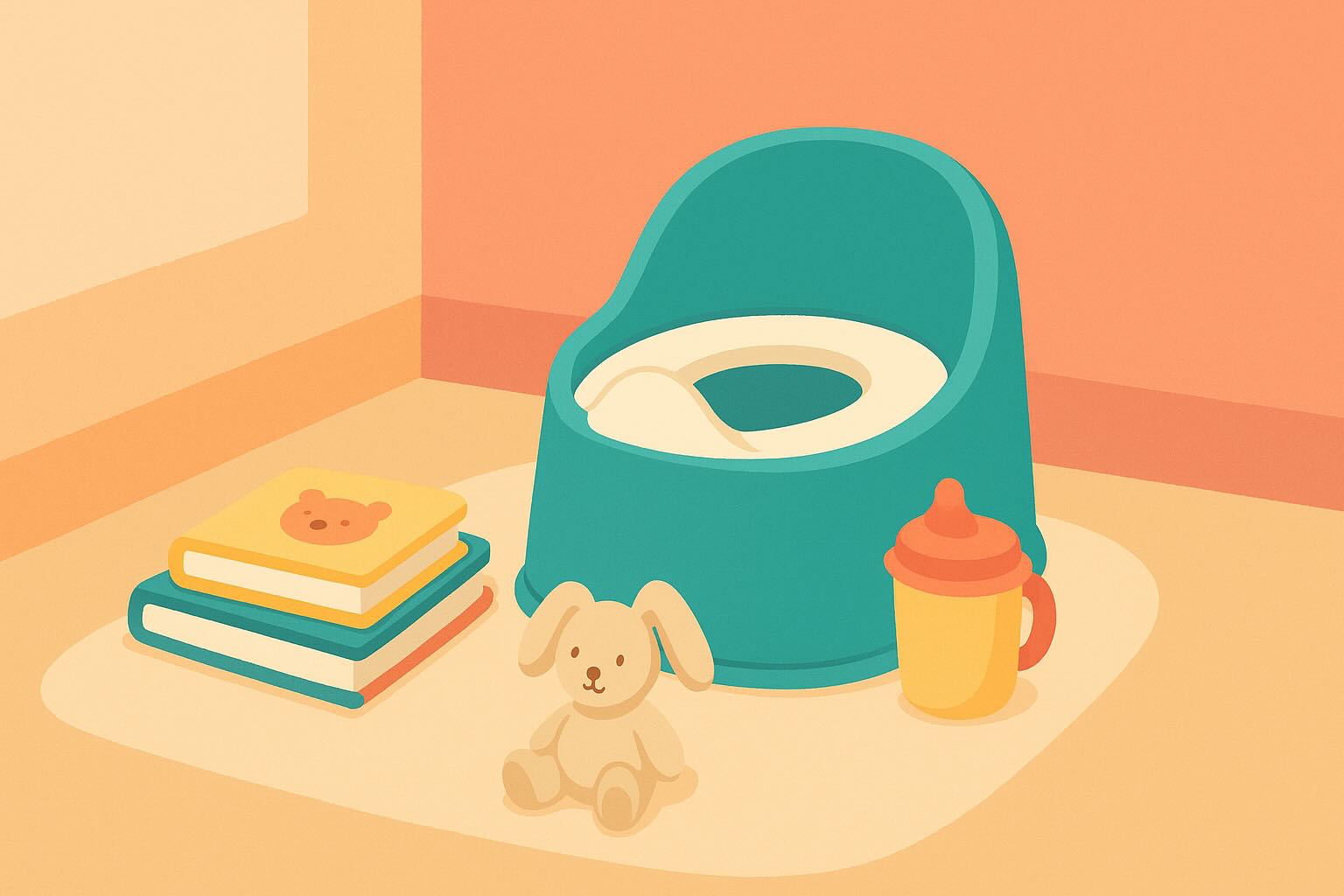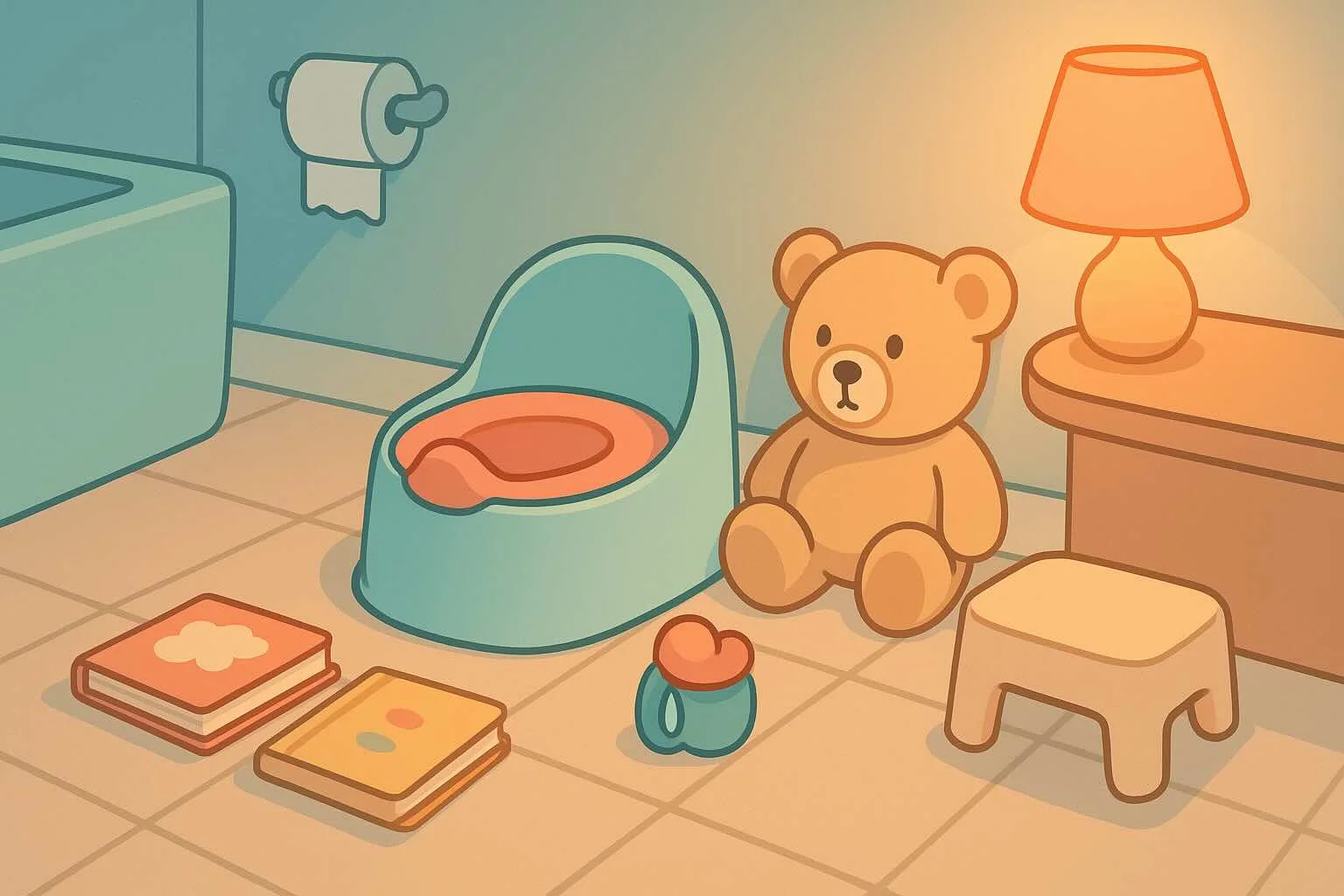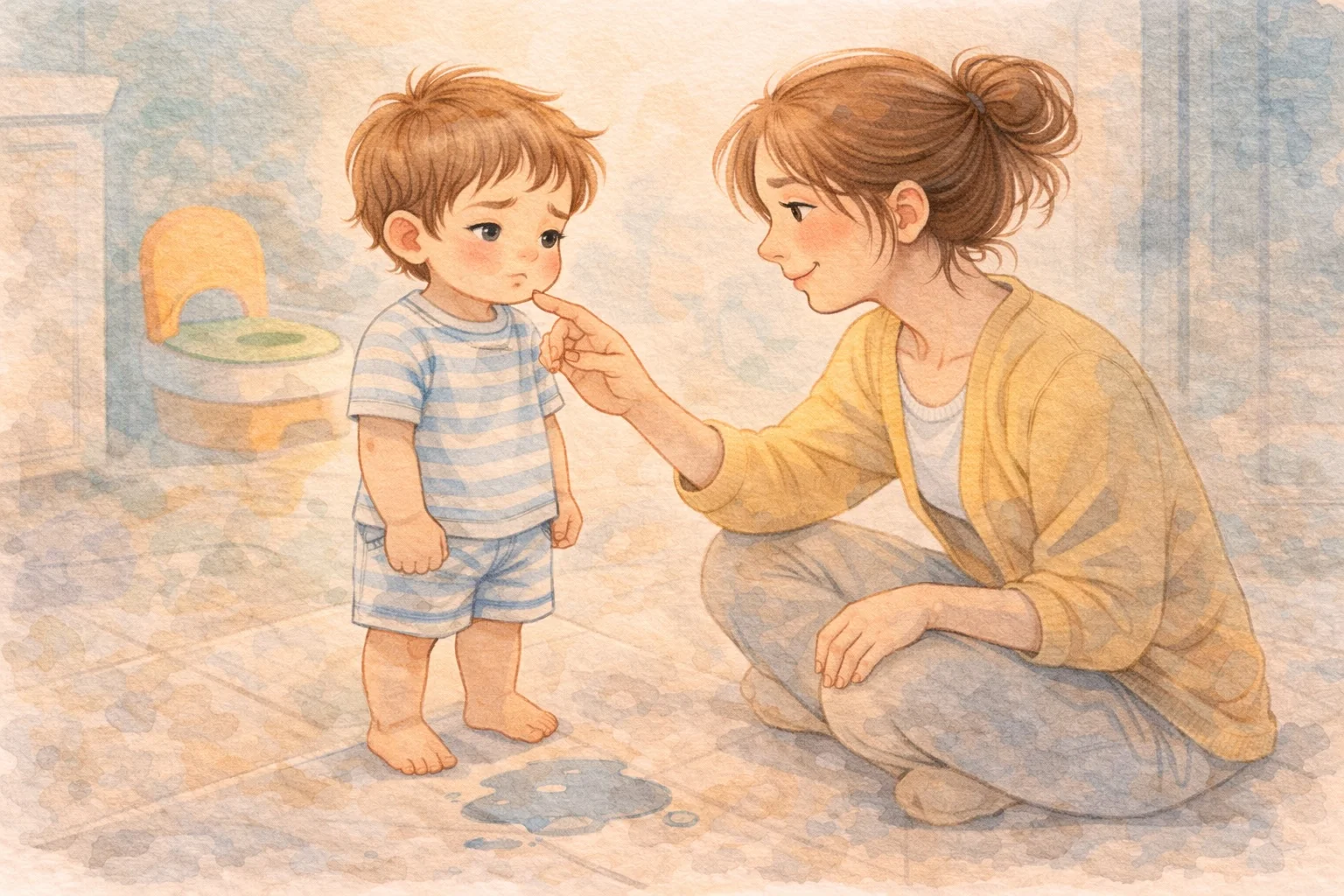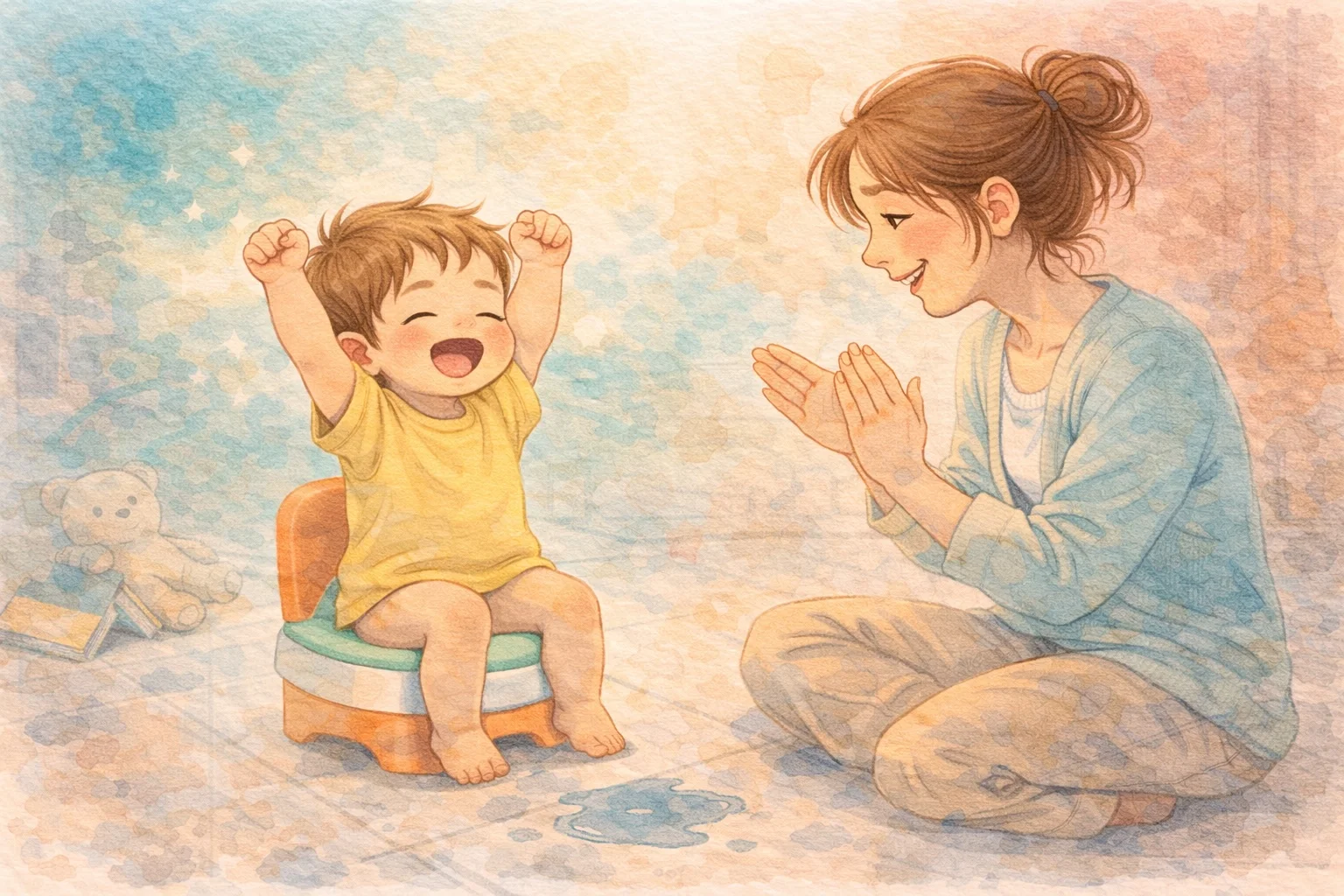2 Year Old Potty Training: When Readiness Matters More Than Age


"My daughter just turned 2, and everyone keeps asking if we've started potty training yet. My mother-in-law keeps hinting that I was trained at 18 months. The daycare has a 'potty training by 3' requirement. But when I put my daughter on the potty, she just sits there, then pees on the floor five minutes later. Am I doing something wrong?"
You're not doing anything wrong. You're experiencing the disconnect between cultural expectations about potty training age and the reality of your child's developmental readiness.
Here's what most potty training advice gets wrong about 2-year-olds: age is just a number. What matters is whether your specific child's brain, body, and emotions are ready for this skill—and that has nothing to do with what month they were born or what other kids their age are doing.
In this guide, you'll learn:
- The 6 developmental readiness signs that matter more than age
- Why starting too early actually makes training take longer
- The "interest-led" approach that respects your 2-year-old's timeline
- How 2-year-old brain development affects potty learning
- What to do when your child isn't ready (and why that's okay)
- A simple setup that supports toddler autonomy
Let's start with what science tells us about 2-year-olds and potty readiness.
The Age vs. Readiness Reality Check
The cultural myth: Kids should be potty trained by age 2, or you're "behind."
The developmental reality: The average age of complete potty independence is 27-32 months—and the range of "normal" spans from 18 months to 4 years.
A comprehensive study published in Pediatrics found:
- Only 40-60% of children achieve daytime dryness by age 3
- Girls typically complete training 2-3 months earlier than boys
- Children who start training before showing readiness signs take 6-12 months longer to achieve independence than those who start when ready
- Cultural expectations have no impact on developmental readiness timelines
Translation: Your 2-year-old doesn't care about your mother-in-law's timeline or daycare requirements. Their brain is developing on its own schedule.
The 6 Developmental Readiness Signs (What Actually Matters)
Forget age. Look for these concrete developmental markers instead:
1. Physical Readiness
Your child's body shows these signs:
- Bladder control: Stays dry for 2+ hours at a time
- Predictable patterns: Regular, formed bowel movements
- Motor skills: Can pull pants up and down independently
- Physical stability: Can sit on potty seat without needing support
Why it matters: These indicate the nerve connections between brain and bladder/bowel are mature enough to send and receive "need to go" signals.
2. Cognitive Readiness
Your child's understanding includes:
- Body awareness: Recognizes the sensation of needing to pee/poop before it happens
- Cause and effect: Understands that pee/poop comes from their body
- Simple instructions: Can follow 2-3 step directions ("Go to bathroom, pull down pants, sit on potty")
- Language comprehension: Understands words like "pee," "poop," "potty," "dry," "wet"
Why it matters: Without these cognitive connections, potty training is just random luck, not genuine learning.
3. Communication Ability
Your child can signal needs through:
- Verbal communication: Can say "pee," "poop," "potty," or their own words for these
- Non-verbal signals: Points to diaper, pulls at pants, or has consistent "potty face"
- Advance warning: Can communicate need with enough time to get to potty (even if just 30 seconds)
Why it matters: If they can't tell you they need to go, they're dependent on you remembering to prompt—that's not independence, it's adult-directed.
4. Emotional Readiness
Your child demonstrates:
- Interest: Curious about potty, wants to watch others, asks questions
- Desire to please: Generally wants to cooperate (not in constant opposition mode)
- Frustration tolerance: Can handle minor setbacks without complete meltdown
- Comfort with change: Not in a major life transition (new sibling, move, parent separation)
Why it matters: Potty learning requires emotional resilience. A child who's emotionally overwhelmed by life changes doesn't have the capacity for this skill.
5. Motor Skill Development
Your child can physically:
- Walk independently: To and from bathroom
- Sit unsupported: On potty for several minutes
- Undress/dress: Pull pants and underwear down/up (even if not perfectly)
- Wipe attempts: Begin learning to wipe (with help)
Why it matters: Physical independence is essential. If you're doing all the physical work, they're not learning autonomy.
6. Independence Drive
Your child shows:
- "Me do it!" attitude: Wants to do things independently
- Imitation: Copies what older kids/adults do
- Big kid interest: Talks about being a "big kid," interested in underwear
- Pride in accomplishments: Enjoys mastering new skills
Why it matters: This is the fuel for potty learning. Without intrinsic motivation, training becomes a battle.
Reality check: Your child doesn't need all of these signs, but they need most of them. If you're only seeing 2-3 out of 6 categories, they're not ready—and that's okay.
Why Starting Too Early Backfires (The Research)
"But won't it be easier if we start early, so they're used to it?"
Actually, no. Here's what happens when you start potty training before developmental readiness:
Longer Training Timeline
The research: A study in Journal of Pediatric Urology found that children who began training before 27 months took an average of 10.8 months to achieve daytime dryness. Children who started after 27 months took an average of 5.1 months.
Translation: Starting earlier doesn't mean finishing earlier. It often means spending more months in potty training limbo.
Increased Power Struggles
The developmental reality: 2-year-olds are in a critical autonomy development stage. Their brains are hardwired to assert independence and test boundaries.
When you add potty pressure before they're ready, you're not teaching a skill—you're creating a battleground over one of the few things they actually control: their body.
Higher Stress for Everyone
The parent experience:
- Constant vigilance watching for signals
- Frequent accidents to clean up
- Frustration when they "could do it yesterday"
- Guilt about being impatient
- Comparison anxiety with other kids
The child experience:
- Confusion about expectations they can't meet
- Shame about accidents
- Anxiety about disappointing you
- Loss of autonomy (it's your idea, not theirs)
Potential for Shame and Regression
The long-term risk: When children experience repeated "failures" at something they're developmentally unprepared for, they can develop:
- Shame responses around bodily functions
- Anxiety about using the potty
- Withholding behaviors (especially poop)
- Regression when stressed
- Negative associations that make later training harder
Expert perspective: Dr. T. Berry Brazelton, pediatrician who researched potty training for decades, found that the most successful training happens when parents follow the child's readiness cues rather than external timelines.
The Interest-Led Approach for 2-Year-Olds
If your 2-year-old is showing genuine readiness signs, here's the approach that respects their developmental stage:
Phase 1: Normalize the Potty (No Pressure)
Timeline: 2-4 weeks before active training
What to do:
- Place a small potty in the bathroom (their choice of color if possible)
- Read potty books together casually
- Let them observe family members using the toilet (if everyone's comfortable)
- Talk about body functions matter-of-factly: "I'm going to pee. My body is telling me it needs to."
- Let them flush the toilet (kids love this!)
- Practice sitting on potty clothed, just to explore
What NOT to do:
- Force them to sit on potty
- Ask constantly, "Do you need to go potty?"
- Show disappointment when they don't use it
- Compare to other kids
- Create expectations around using it
The goal: Familiarity and curiosity, not performance.
Phase 2: Introduce the Concept (Their Choice)
Timeline: When you see majority of readiness signs
What to do:
- Offer choice: "Would you like to try the potty or use your diaper?"
- Celebrate interest: "You noticed you needed to pee! Bodies are so smart."
- Stay neutral about outcomes: "You sat on the potty. Thanks for trying that."
- Let them pick out "big kid underwear" (if interested)
- Keep diapers as a zero-pressure option
Scripts that work:
- "Your body is learning about pee and poop. You can use the potty or your diaper—you decide."
- "Some kids use the potty, some kids use diapers. When you're ready to try the potty, let me know."
- "I notice you're interested in the potty! That's really cool. You're learning about your body."
What to avoid:
- "Don't you want to be a big kid and use the potty?" (shame/comparison)
- "You're too old for diapers!" (pressure)
- "If you use the potty, you'll get a treat!" (external motivation)
- "Why won't you just go on the potty?" (frustration)
Phase 3: Support Their Lead
Timeline: Ongoing as they show initiative
When they succeed:
- Acknowledge what they did: "You peed in the potty!"
- Celebrate their awareness: "You noticed your body needed to go!"
- Emphasize their choice: "You decided to use the potty."
- Keep it low-key: Matter-of-fact acknowledgment, not over-the-top praise
When they have accidents:
- Stay completely neutral: "Pee came out. Let's get you cleaned up."
- No punishment, no shame, no lectures
- Involve them in cleanup: "Can you help me get clean clothes?"
- Restate their control: "Next time you notice pee coming, you can use potty or diaper."
For complete accident response scripts, see our potty learning complete guide.
Managing Expectations: What 2-Year-Old Brains Can (and Can't) Do
Understanding your 2-year-old's brain development helps you calibrate expectations:
What Their Brain CAN Do
- Pattern recognition: Learn that certain body feelings mean pee/poop is coming
- Simple cause-effect: Understand "if I sit on potty and relax, pee comes out"
- Basic autonomy: Make simple choices and feel proud of accomplishments
- Imitation: Copy what they see others doing
What Their Brain CAN'T Do Yet
- Reliable executive function: Interrupt a fun activity to use the potty every single time
- Future planning: Think "I'll need to pee in 20 minutes, so I should go now"
- Consistent impulse control: Stop play when body sends signals, every time
- Multi-tasking: Stay aware of body while engaged in complex play or new environments
What this means practically:
- Accidents are learning, not failure: Their brain is still building the neural pathways for body awareness
- Reminders are normal: "Let's check if your body needs the potty" is developmental support, not your failure
- Home vs. out discrepancies: Totally normal—new environments overwhelm their limited attention capacity
- Good days and bad days: Brain development isn't linear; variation is expected
For more on how toddler brain development affects behavior, see our toddler tantrum guide.
What to Do When Your 2-Year-Old Isn't Ready
Scenario: Your child just turned 2, and they're showing maybe 1-2 readiness signs, but not the full picture.
What well-meaning people might say:
- "Just put them in underwear—they'll learn fast!"
- "You need to be consistent or they'll never learn!"
- "My kids were trained by 18 months!"
- "The daycare won't take them if they're not trained by 3!"
What the science says: Wait.
The Benefits of Waiting
When you wait for genuine readiness:
- Faster training: 3-6 months vs. 10-12+ months
- Fewer accidents: Better body awareness = more successes
- Less stress: For you and your child
- More autonomy: It's their accomplishment, not your enforcement
- Lower regression risk: Skills built on readiness are more stable
What "Waiting" Looks Like
Not: Doing nothing and ignoring the topic completely
Yes: Creating a potty-friendly environment without pressure
- Keep potty visible in bathroom
- Read potty books casually
- Talk about body functions matter-of-factly
- Let them observe (if comfortable)
- Answer questions honestly
- Reassess readiness monthly
Your response to pressure:
- "We're waiting for readiness signs, which is what research recommends."
- "Every child's timeline is different. We're following [child's name]'s cues."
- "Early training doesn't mean faster results—we're avoiding unnecessary stress."
For daycare requirements: See our guide on managing daycare potty training requirements.
Simple Setup That Supports 2-Year-Old Autonomy
If your child is showing readiness, here's a minimalist setup that supports their independence:
Essential Items
- Small potty or potty seat: Child's choice (control matters!)
- Step stool: For toilet access and hand washing
- Easy clothing: Elastic waist pants they can pull down themselves
- Spare clothes: Multiple sets in every location
- Cleaning supplies: Within your reach, normalized as "accidents happen"
Optional Items
- Potty books: Normalize the concept
- Underwear: If they show interest in "big kid" underwear
- Portable potty: For car/outings if helpful
What You DON'T Need
- ❌ Sticker charts/reward systems
- ❌ Special potty training dolls
- ❌ Elaborate bathroom decorations
- ❌ Pressure, timers, or scheduled sits
- ❌ Comparison to other kids
Remember: The simpler the setup, the more it's about their learning and less about your program.
When to Reassess (And When to Seek Support)
Monthly Check-In Questions
Every 4-6 weeks, honestly assess:
- Is my child showing more readiness signs than before?
- Are they initiating interest or resisting pressure?
- Am I feeling stressed and frustrated, or following their lead?
- Is this working for our family, or creating battles?
If progress stalls or regresses, see our potty training regression guide.
When to Consult Your Pediatrician
Seek professional guidance if:
- Your child is 4+ and showing no interest or readiness
- Painful urination or bowel movements
- Chronic constipation or withholding
- Extreme fear or anxiety around potty
- Significant regression after being consistent
- Suspected medical issues
For poop-specific anxiety, see our poop withholding and anxiety guide.
The Bottom Line on 2-Year-Old Potty Training
Age 2 is not a magical readiness milestone. It's an arbitrary cultural marker that has nothing to do with your individual child's developmental timeline.
What matters:
- Your child's specific readiness signs (physical, cognitive, emotional, motor, communication, independence)
- Your willingness to follow their lead rather than external timelines
- Creating a pressure-free environment that supports their autonomy
- Understanding that waiting for readiness makes training faster and easier
What doesn't matter:
- What other kids are doing
- When you were trained
- Social pressure from family or friends
- Arbitrary daycare "requirements"
Your job isn't to train your child to use a potty. Your job is to notice when they're ready to learn this skill and provide the support that honors their autonomy and developmental stage.
When you do that, potty learning becomes what it should be: your child's accomplishment, on their timeline, driven by their own readiness.
And that's worth waiting for.
Related Resources
- Potty Learning Complete Guide - Comprehensive overview of the entire potty learning journey
- 3 Year Old Potty Training Guide - Next stage strategies for older toddlers
- Potty Training Regression Guide - Handling setbacks during learning
- Potty Training Accidents Guide - Responding to accidents without shame
- Daycare Potty Requirements Guide - Navigating preschool deadlines
Complete Potty Learning Toolkit
Readiness assessments, age-specific strategies, and practical scripts to support your child's potty learning journey.
Need personalized support?
RootWise's AI coach can provide tailored strategies for your specific situation, available 24/7 when you need it most.
Learn More About AI Coaching →



